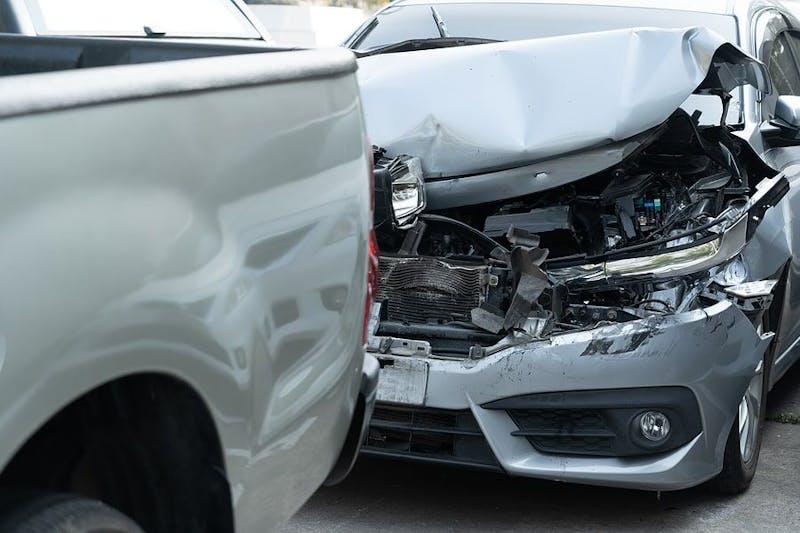Get a Free Consultation
2 minute response
24 hours a day, 7 Days a Week
Dedicated Trust Guss Intake Team

Each year, thousands of people sustain injuries in Houston car accidents. If you are one of them, you need to know what to do after a Houston car accident so you don't jeopardize your legal rights to receive financial compensation.
Unfortunately, at an accident scene, you're usually on your own. You must do everything you can to protect your legal rights and ensure your own safety. That often begins with remaining calm during those anxious post-accident moments.
An experienced car accident lawyer in Houston can determine your right to recover compensation if you're dealing with minor or serious injuries following an accident someone else caused. It's important you know what to do and what not to do after an accident in Houston, and the following article should help. For specific advice regarding your situation, contact a Houston car accident today for a free consultation.
What you say or do immediately following an accident often affects what happens later. After a crash, you and the other driver become the center of attention. Whether you're feeling remorseful or lashing out in anger, someone is probably listening. The words you speak after an accident might not come back to haunt you.
The Latin term res gestae describes the type of spontaneous statements a person makes during an emergency situation. Legal authorities consider them relevant and truthful, so they often allow them as evidence in court. Long before you're involved in a court case, angry, post-accident statements or admissions sometimes end up in witness statements and police reports. They inspire questions during insurers' recorded statements and depositions.
People who make decisions about your claim want to know why you said what you said and what you meant when you said it. To avoid this problem, consider these three tips.
Continue this mild behavior when you interact with the investigating police officer. Don't speculate. Convey only facts, only what you know for sure.
Texas Transportation Code, Chapter 550, Accidents and Accident Reports, requires that you stop if an accident occurs. If anyone has injuries or property damage exceeding $1,000, you must also call the police or sheriff. You must also:
As Texas requires that you assist injured people involved in your accident, you should tell the 911 operator that you or someone else need a police officer and an EMT. This reduces response delays.
When police officers investigate an accident, they explain what they see, but they don't decide who is at fault. They gather evidence, which usually consists of verifiable facts: Driver A struck the side of Driver B's car. Witness X stated that Driver A ran the stop light. Driver B shows signs of a suspected minor injury.
Unless a police officer witnesses an accident, their report provides an opinion about what happened. They may file justifiable charges, which may consider speeding, distracted driving, or other provable acts. Insurance companies use police reports as documentation of what happened. A police report often influences their decision to pay the other driver's liability claim. They also consider other available evidence before making a decision.
While waiting for a peace officer to arrive, take the opportunity to document the scene with your cell phone camera. If you can't move without discomfort, ask a bystander to help you. Even if you take only a few photos, they give your insurer visible evidence of how the accident occurred.
Texas requires that drivers move their vehicles off the road after an accident to avoid obstructing traffic. However, once you move your car, it eliminates any evidence gained from inspecting the post-accident scene. By the time a police officer arrives, the scene will be completely different. Lighting and weather can change. Witnesses leave the scene. Cars scatter accident debris. Sometimes, drivers leave the accident scene.
After documenting the available evidence as much as you can, move your vehicle and passengers to a safer position. You'll have photos that show your insurer the accident location and crash impact details. If you can't move your vehicle, surround your car with flares or reflective signs to warn other motorists.
Saying you're fine is another impromptu statement that often comes back to haunt you. When you have injuries such as whiplash or traumatic brain injury, you might not notice any symptoms until days or possibly weeks after a crash. If you feel fine after an accident but develop symptoms a few days later, you create a credibility gap between you and the involved insurance companies. Their representatives remain suspicious until they settle your case or close your file.
Get medical treatment, complete your medical care, and follow up with your doctor to confirm your injuries. Even if you don't feel your injuries are severe, get a medical evaluation anyway. You could have internal bleeding or other injuries that require prompt medical attention.
Also, claim investigators examine every aspect of an injury claim. Your treatment becomes a primary measure by which they evaluate your injury severity and your claim's settlement value. If you don't seek treatment, insurers can interpret that to mean you didn't suffer injuries.
Of course, if you sustained severe injuries, seek emergency treatment. Talk to the doctor about your injury concerns and make arrangements for an immediate injury assessment and a later follow-up visit. Your emergency examination documents and medical records will serve as evidence in your insurance claim.
You must also follow your doctor's orders. Your compliance (or lack of compliance) with doctor's orders becomes another measure by which the insurance company measures your injury severity. If you don't keep your appointments, don't fill your pain medicine prescription, or don't do what the doctor says, the insurance company will usually question your injury. Don't give the insurance company reasons to dispute your accident-related injuries, especially if they result in disabilities.

When you make an injury claim, insurers consider a lot of legal issues you might not know or recognize. You should contact your own insurance company immediately once you return home after your accident. Before you do that, contact a personal injury attorney for guidance.
Auto policy requirements stress timely accident reporting. Your insurer wants to assess liability issues before the situation spins out of control. Most liability insurers require a report even if you don't feel you caused the accident. As they have to protect and defend you against liability claims and lawsuits, they have a right to make that decision themselves.
Your report to your insurer also puts them on notice of a potential uninsured/underinsured motorist claim. UM/UIM coverage isn't mandatory in Texas. If you have the optional coverage on your auto policy, your insurer might not explain if it applies to your claim. UM/UIM coverage pays your bodily injury liability claim if the other driver has no liability coverage, doesn't have enough coverage, or leaves the scene, unidentified, after a Houston accident.
If the other driver's insurance company calls or knocks on your door, you shouldn't talk to them. When they contact you, that means they are investigating a liability claim. If you let them into your home, they will ask questions, observe your actions, look at your surroundings, and ask for a recorded statement. Your personal injury lawyer will eventually provide the claim information the liability insurers seek, but they decide what information they should provide.
When insurance investigators take your statement, they listen carefully and analyze everything you say. They ask the same questions in different ways, looking for inconsistencies in your responses. They listen for details that either confirm or dispute liability for your injuries. When they record you, their digital device memorializes everything you say. If you make a mistake, you can't take it back.
A year after your Houston accident—or even six months later—you won't remember all the excruciating details about your pain and suffering. You will have forgotten how much it disrupted your life. When you give a deposition or discuss settlement values, you realize that the pain and bad memories have somewhat faded.
That's what happens as you recover from injuries. You forget the pain you endured during your initial recovery. You forget important details about your injuries and how they altered your lifestyle.
Recovery feels good, but when you have no definitive recollections about your post-accident life, you can't talk about all the difficulties you endured. When you can't justify why your claim has significant value, it affects negotiations, mediations, and trial outcomes. That's why tracking your injuries and recovery from day one is crucial.
Create a journal that helps your attorney evaluate your injury claim. It gives them talking points to use during negotiations.
When a liability insurer can’t get the information they need directly from you, they get it any way they can. They perform various activities as part of an activities check. You might not know they’re out there, but they watch you one way or another. Insurance investigators see anything you do as an information source.
Insurance companies use any information their investigators find to dispute your injuries, justify a reduced claim value, and offer a low settlement. To minimize their reach, don’t talk to anyone about your injuries other than your immediate family and your personal injury attorney. Also, consider these actions.
This might sound like a hard thing for many to do, but take a break from social media. Car accident claims and social media do not mix well. What is the big deal with posting to social media after an accident? Remember, insurance companies will try all sorts of tactics to avoid paying you the money you deserve after you get hurt in an accident.
One of those tactics is to monitor your social media feed to gather intel on you and your life. They may follow you, your family, or your friends. In doing so, they aim to find pictures or posts that make it look like you're not as badly hurt as you claim and use them against you to reduce or deny your claim.
Posting to social media can hurt your chances of recovering compensation after an auto accident. It is best to take a break from social media and make sure you protect your legal interests.
Houston car accident injury claims are usually far more complicated than you imagine. When you're seriously injured in an accident, you need a personal injury lawyer looking out for you. When you contact a Houston car accident lawyer, you can talk to a legal professional and discuss your case for free. Personal injury attorneys usually work on a contingency basis and don't charge a fee for their services unless they settle your case or win a court judgment.
Contact a Houston car accident attorney today for advice regarding your legal options and help in getting the maximum compensation you deserve.
2 minute response
24 hours a day, 7 Days a Week
Dedicated Trust Guss Intake Team